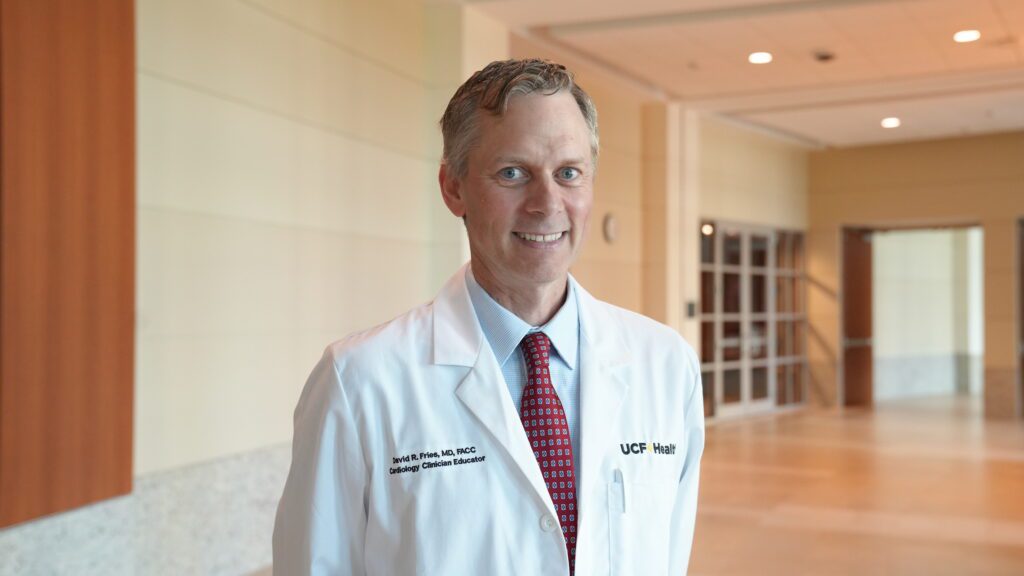February is American Heart Month, so we asked Dr. David Fries, a cardiologist at UCF Health Faculty Physician Practice, to give us advice on the best ways to improve health heart. Dr. Fries, who cares for patients across the community and teaches UCF medical students, uses ABCDE as an acronym for the latest findings on heart health:

A – Assessment. Patients over age 40 should discuss heart health with their physician and undergo an assessment of their risk for heart disease. Today, physicians have a computerized calculator that can provide a risk score based on your age, gender, family history and other factors such as whether you have diabetes or inflammatory diseases like rheumatoid arthritis. This initial calculation can help identify if you are at low, intermediate or high risk for heart attack or stroke. In addition, for selected low- and intermediate-risk patients, Dr. Fries suggests honing that assessment of risk further with a cardiac artery calcium (CAC) score. CAC scoring is a quick, non-invasive, non-contrasted CT scan of the chest and can be done at any radiology center. As we age, cholesterol plaque can develop in the arteries of the heart, and, as a protective mechanism, the body places calcium deposits around these plaques. CAC scoring has markedly improved our ability to accurately identify patients at very low risk for heart disease as well as identifying asymptomatic patients with a large burden of coronary artery disease that would otherwise go undetected. Cardiac calcium tests are not generally covered by insurance and cost about $100. While that initial cost may seem high, a normal CAC score may allow patients to avoid costly testing and potentially years of unnecessary medication down the road. Once you and your physician know your actual risk for heart disease, you can work together to manage those risks through lifestyle changes and, if necessary, medication. Remember, knowledge is power.
B – Blood pressure. High blood pressure is a leading cause of heart disease and often happens without symptoms. Generally, you want a blood pressure of less than 120/80 for optimum heart health. For everyone with a blood pressure above 120/80, blood pressure may be lowered by exercise, a low-salt diet, avoidance of NSAIDs and reduced alcohol consumption. The threshold for initiating medication in low-risk patients is 140/90. For patients with established heart disease, or those at intermediate or high risk for heart disease, the threshold for starting a medication drops to 130/80.
C – Cigarettes and Cholesterol. Smoking cessation dramatically improves your heart health, as well as reducing your risk for other serious diseases like cancer. High cholesterol also increases your risk of heart disease. Treating high cholesterol again depends on your overall assessment (see A). Patients with a low risk may be able to avoid cholesterol–lowering drugs but should focus on a heart-healthy diet and exercise. Intermediate- and high-risk patients, in addition to diet and exercise, may further benefit from prescription therapy to not only reduce their cholesterol, but more importantly reduce their risk for heart attack and stroke. Statins are the most prescribed cholesterol-lowering medication to reduce risk of heart attack and stroke.

D – Diet. A heart-healthy diet is based on whole (unprocessed) foods, lean meat, fruits and vegetables, high-fiber grains and low-fat dairy. Think forks over knives – a diet with more fruits and vegetables and less meat. The Mediterranean diet has shown significant results in improving heart health. Visit the farmer’s market for fresh produce. Avoid packaged goods with ingredients you can’t pronounce. Eat foods as close to their original state as possible.
E – Exercise. You need 150 minutes a week of moderate exercise for good health. Split up that time in any way that works for you. And find ways to move that you enjoy. You don’t need a gym membership or fancy exercise equipment. Take the dog for walks. Garden. Walk around the shopping mall. Take the stairs instead of the elevator. Schedule a walking meeting with your colleagues. Swim in your pool.
The best way to stay heart healthy, according to Dr. Fries, is to know your risk and work with your physician to lower your chances of having a heart attack, stroke or sudden death from heart disease.
Dr. Fries is a board-certified, non-invasive cardiologist specializing in the diagnosis, treatment and prevention of all forms of cardiovascular disease. He received his medical degree at the University of Buffalo Jacobs School of Medicine. He returned to his hometown of Rochester, NY to complete both his Internal Medicine residency and Cardiovascular Disease fellowship at the University of Rochester-Strong Memorial Hospital. For more information on Dr. Fries and all the providers at UCF Health Faculty Physician Practice, please visit https://ucfhealth.com/